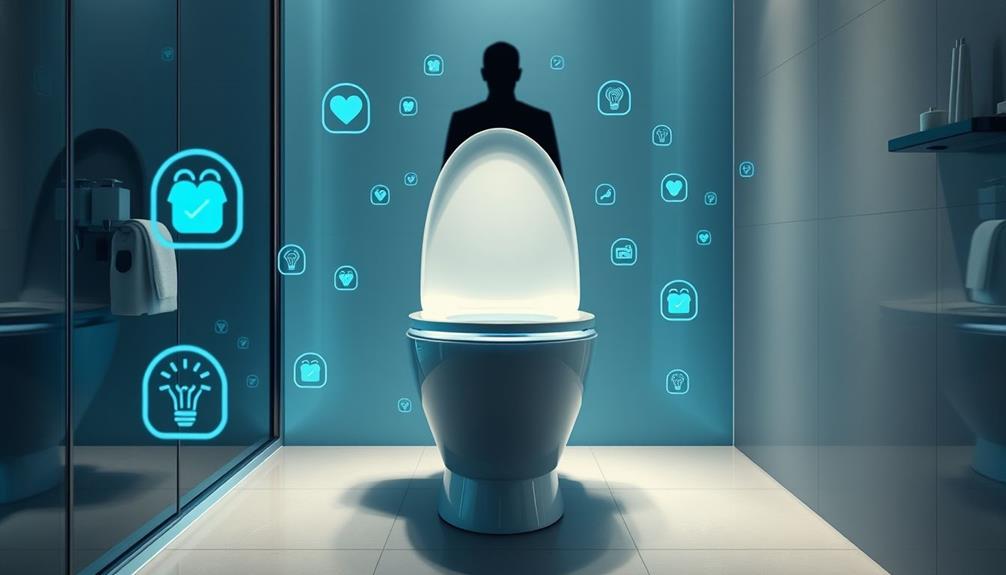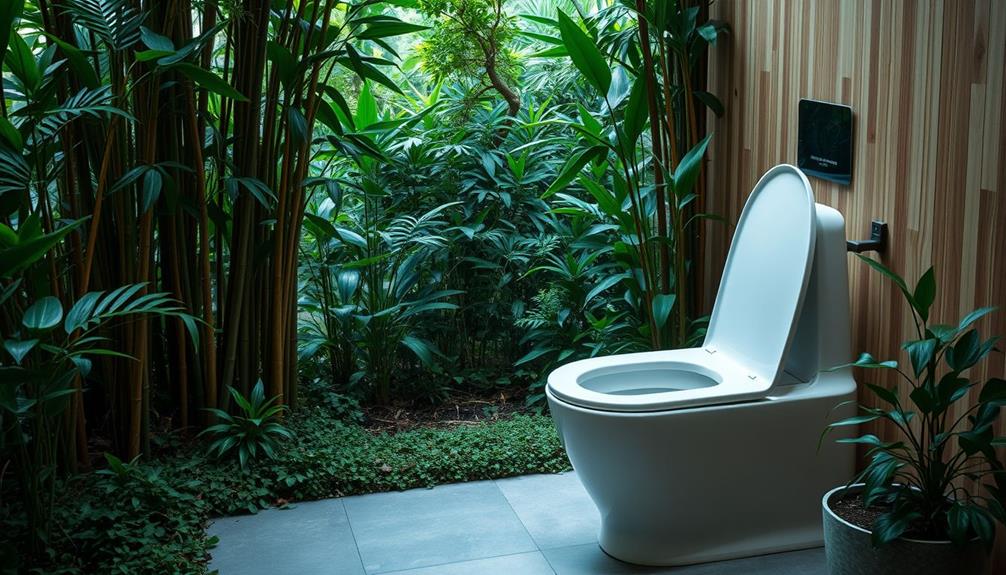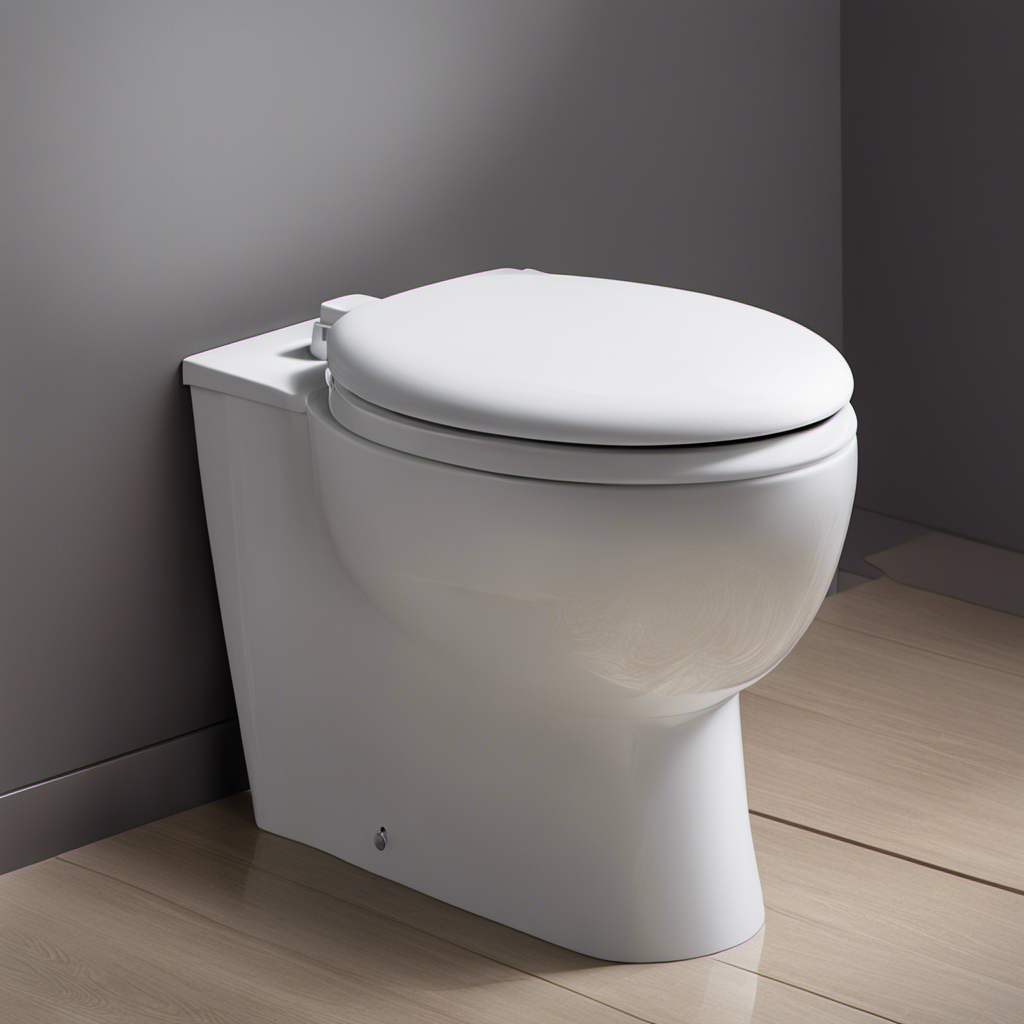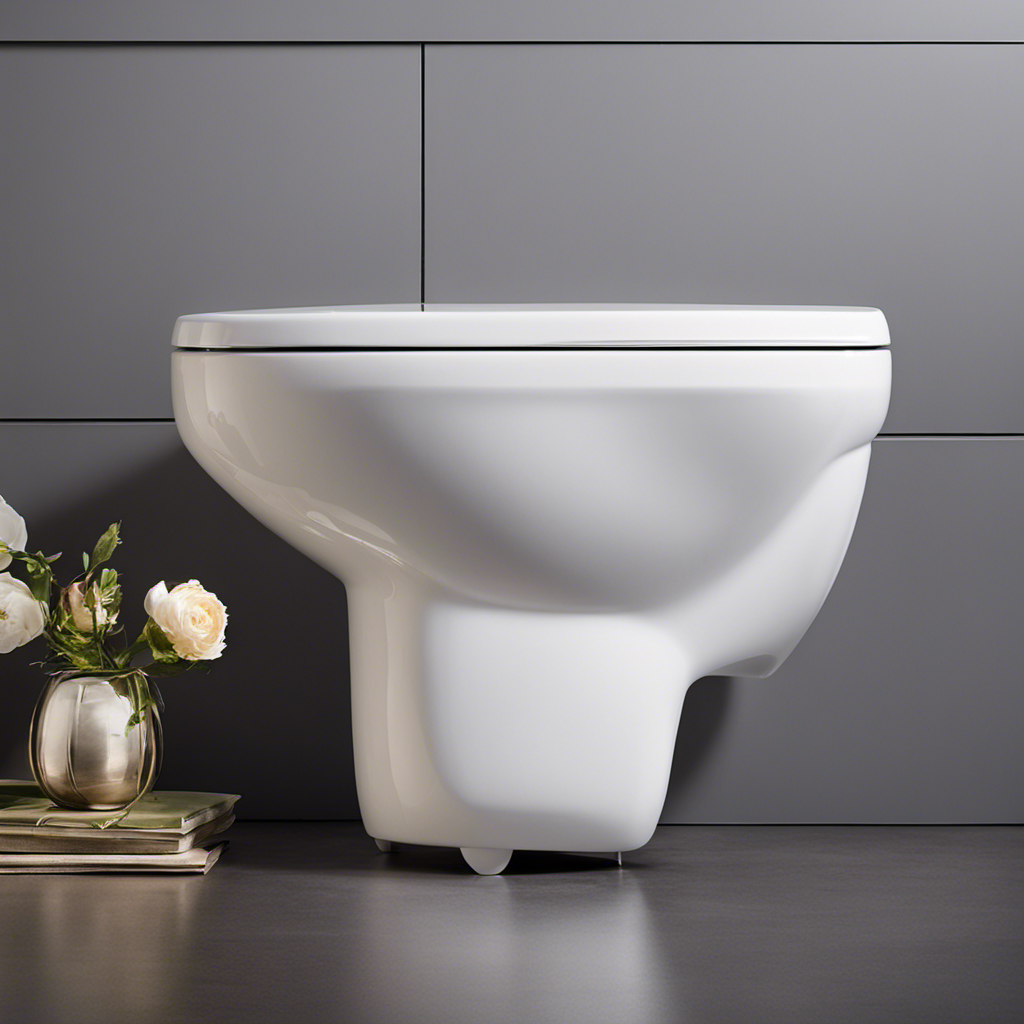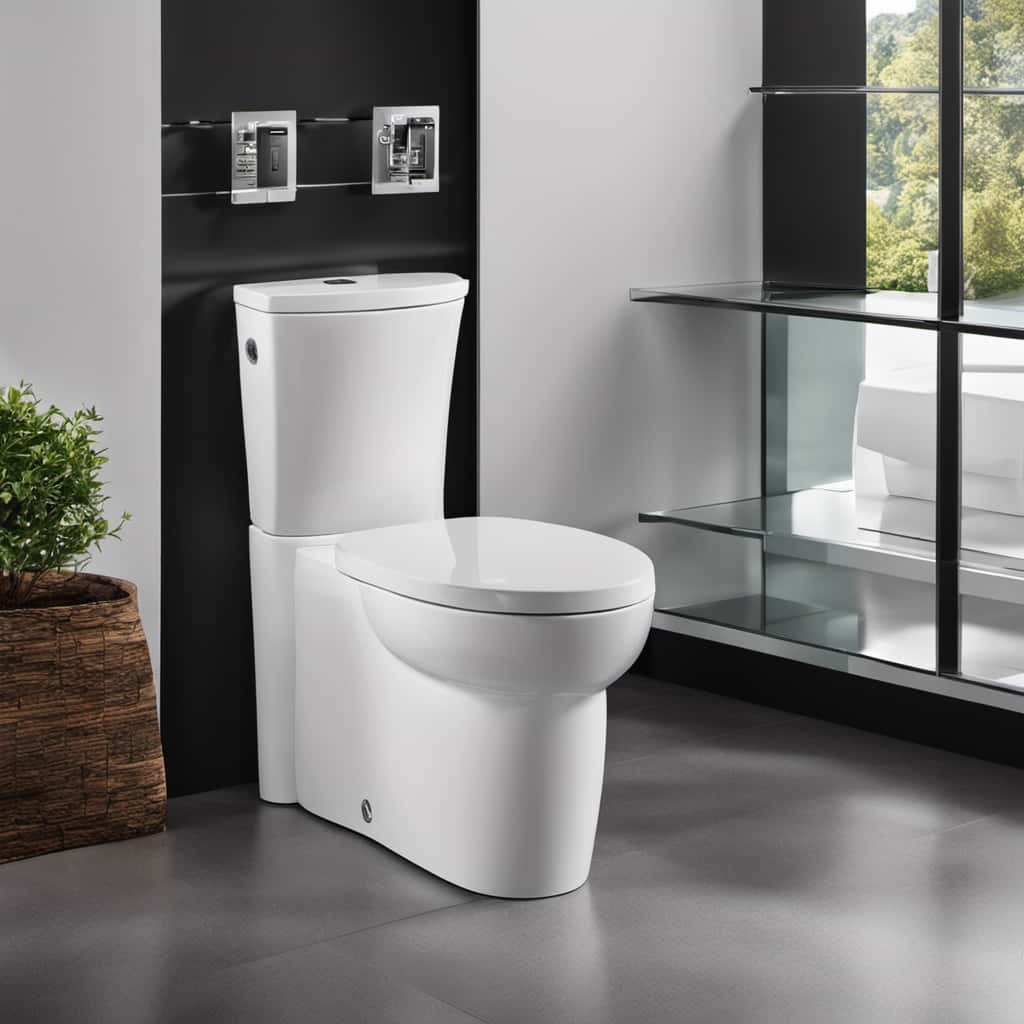Smart toilets offer a blend of health benefits and privacy concerns. By collecting detailed health data, these devices can detect over 600 health conditions, promoting proactive health management. However, the collection of sensitive information raises serious privacy risks. Hacking could expose personal data, and current security measures often fall short. Users might hesitate to share their data due to concerns about misuse and consent. Balancing these factors is essential for acceptance. So, if you want to explore how smart toilets navigate these complex issues, there's more to uncover about the ongoing discussions in this evolving field.
Key Takeaways
- Smart toilets offer significant health benefits by detecting over 600 conditions, promoting proactive health management and timely interventions.
- Privacy concerns arise from sensitive data collection, with risks of hacking and inadequate consent mechanisms potentially compromising user information.
- Existing privacy laws may not adequately protect user data or keep pace with technological advancements, raising ethical issues surrounding data sharing.
- User willingness to share data increases with clear communication about health benefits and robust privacy protections, fostering trust in the technology.
- Effective integration into daily routines relies on user comfort and control over personal data, balancing convenience with privacy concerns.
Smart Toilet Technology Overview
Smart toilets represent a groundbreaking advancement in health technology, merging everyday bathroom fixtures with sophisticated sensor systems. These smart toilets are equipped with advanced sensor technologies that analyze waste data, providing you with vital health insights. By monitoring aspects like urine flow and waste texture, they can help detect diseases such as cancer and infections, allowing for early intervention.
Additionally, understanding toilet mechanics and the importance of proper waste disposal can contribute to overall health, making smart toilets an even more valuable addition to modern bathrooms, especially as toilet types and efficiency continue to evolve.
Using biomarker technology, smart toilets can also track various health indicators. They can identify the presence of blood in urine and gather metabolic health information tied to your nutrition and lifestyle. Research at Stanford Medicine has propelled this technology, aiming to enhance early disease detection through real-time monitoring.
Moreover, smart toilets connect to secure cloud storage, enabling the safe transmission of health data. This capability raises important discussions around data privacy and user consent, ensuring that your health information remains protected.
The potential integration of smart toilet technology into public health applications could facilitate large-scale health monitoring, tracking infectious disease outbreaks, and improving urban living through smart city initiatives. As you consider the benefits, it's important to weigh the implications of this innovative technology on your health and privacy.
Health Benefits of Data Collection

By leveraging advanced data collection capabilities, smart toilets offer significant health benefits that can transform how you monitor your well-being. These innovative devices can analyze urine to detect over 600 human conditions, including serious illnesses like cancer and diabetes, by monitoring metabolites linked to your health and lifestyle.
Regular use of smart toilets can lead to improved awareness about health indicators, promoting proactive health management and encouraging healthier lifestyle choices. Additionally, incorporating insights from the importance and benefits of play can help foster overall well-being in children and adults alike.
Frequent urine monitoring through smart toilets provides real-time health insights, allowing you to make timely interventions based on your individual health data. Imagine having access to non-invasive testing for various biomarkers through the integration of smart toilets with portable mass spectrometry technology. This could enhance the accessibility of health monitoring in your everyday life.
Moreover, smart toilet data collection can improve public health outcomes by identifying trends in disease outbreaks, such as COVID-19, through large-scale, anonymized data analysis. For the aging population, utilizing smart toilets for health monitoring may also enhance medication adherence tracking, providing insights into drug metabolism and overall health management.
With these benefits, smart toilets can empower you to take control of your health and foster a proactive approach to well-being.
Privacy Concerns and Risks

As you consider using a smart toilet, think about the sensitive health data it collects and the potential privacy risks involved.
These devices can be vulnerable to hacking, which might expose your personal information to unauthorized users.
Furthermore, similar to how emails remain vulnerable to hacking, smart toilets may not have robust security measures in place.
Additionally, the current consent mechanisms may not protect you adequately, raising concerns about how your data could be shared or misused.
Data Collection Concerns
Concerns about data collection in smart toilets revolve around the sensitive health information they gather, such as urine and waste analysis. You might worry about how this data could be misused or exposed. With personal health data being collected, privacy concerns escalate, especially considering the potential for unauthorized access.
| Concern | Description | Implication |
|---|---|---|
| Sensitive Data | Smart toilet seats collect detailed health metrics. | Increased risk of privacy breaches. |
| Data Security Measures | Without proper security, hackers can access your data. | Potential exposure of personal info. |
| Consent Mechanisms | Ethical debates on consent types can affect privacy. | User autonomy may be compromised. |
| Legal Protections | Privacy laws exist but may not keep up with technology. | Questions about effectiveness remain. |
It's essential to understand that the information gathered is subject to privacy standards similar to those for healthcare providers. However, the effectiveness of these safeguards in an evolving tech landscape raises significant questions. As you consider smart toilet technology, weigh the health benefits against these data collection concerns to make an informed decision.
Security Vulnerabilities Analysis
Smart toilets, while innovative, come with serious security vulnerabilities that can compromise your privacy. These devices collect sensitive health data, including biomarker information, which can be a treasure trove for hackers if not properly secured.
Security experts warn that unauthorized access to smart toilet systems could expose your personal health information, akin to breaches seen in traditional healthcare environments. Additionally, the collection of health data by smart devices raises concerns about diversification of retirement portfolio and how it parallels safeguarding our personal information, emphasizing the need for robust security measures.
Data gathered by these toilets is subject to the same privacy standards as that from healthcare providers, making stringent data protection measures essential. The ongoing debate about consent mechanisms is critical; you should understand whether you're giving blanket or active consent for your information to be collected. Without clear guidelines, your privacy could be at risk.
Moreover, the ethical implications of health data misuse are concerning. There's potential for law enforcement to access this information, raising alarms about the erosion of your privacy rights.
As smart toilets become more common, it's crucial to scrutinize how data is collected, stored, and shared. Ensuring your privacy is protected should be a priority as you consider the benefits these devices offer.
User Experience Insights
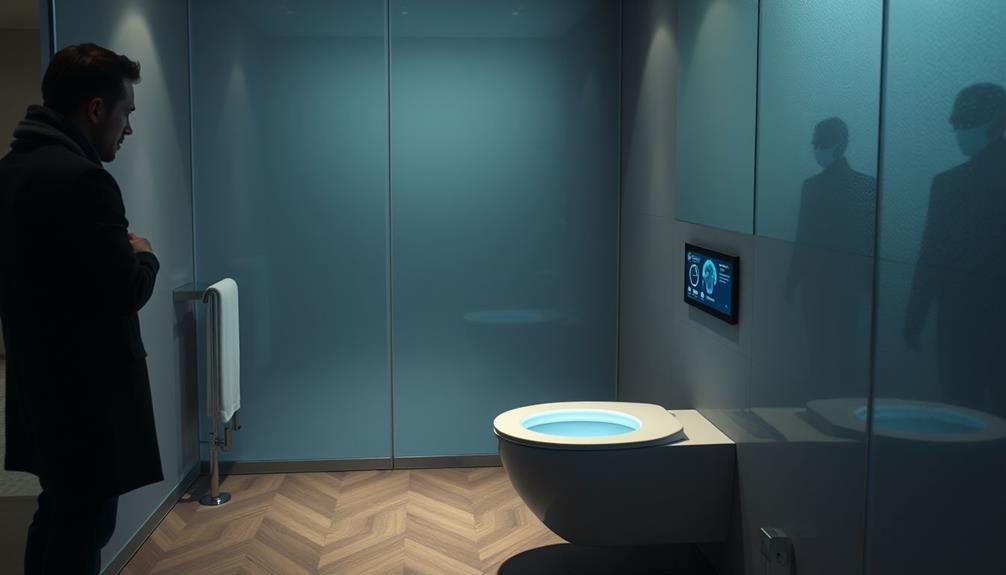
As you explore the user experience of smart toilets, you'll notice that installation can be straightforward but may come with some design challenges.
The data collected by smart toilets can enhance personalized experiences, yet many users are also hesitant about sharing their data, which influences how they integrate this technology into their daily routines.
Balancing convenience and privacy will be key to enhancing your overall experience with smart toilet technology, especially considering the ethical considerations in educational data mining.
Installation Experiences and Challenges
Many users found the installation of smart toilet seats to be relatively straightforward, yet several encountered challenges that stemmed from design flaws and compatibility issues with their existing hygiene practices.
While the initial setup might seem easy, you may face complications during the dismantling process of your old toilet seat, which can disrupt your overall experience. Additionally, having the right tools and essential items for a home cleaning kit can greatly facilitate the cleaning and maintenance of your new smart toilet setup.
Clear installation instructions and support are essential to address these user concerns effectively. Without them, you might feel frustrated, especially if you run into unexpected issues that hinder your convenience.
The shift to a smart bathroom can be exciting, but your comfort level with integrating the smart toilet into your daily routine plays a significant role in how satisfied you're with the experience.
Some participants reported feeling hesitant about adopting this new technology, which could impact their long-term use of smart toilets.
To enhance user acceptance and satisfaction, manufacturers need to focus on improving installation processes and ensuring compatibility with various bathroom setups. By addressing these challenges, you're more likely to enjoy the benefits of smart toilet technology in your home.
Data Sharing Willingness
Data sharing willingness among users of smart toilets reveals a complex landscape of preferences and concerns. You might find that your comfort level hinges on several key factors. Many users express a strong desire for ownership and control over their personal data, which is often a deal-breaker when it comes to sharing.
For instance, similar to users of air purifiers, concerns about health benefits and privacy frequently intersect. Here are three emotional drivers that shape your willingness to share:
- Health Benefits: If sharing your usage data could lead to improved health insights, you might be more inclined to consent.
- Privacy Protection: You likely want assurances that your sensitive information is secure and confidential, which can greatly affect your trust.
- Control Options: Knowing you can opt-out or manage your data preferences gives you a sense of empowerment, making you more open to sharing.
Clear communication about the purpose of data collection also plays a vital role. When you're informed about how your data will be used and the specific benefits it may bring, your data sharing willingness increases.
Ultimately, balancing health benefits with privacy concerns is key to steering through this new technology.
Integration Into Daily Routines
Integrating a smart toilet seat into your daily routine can greatly enhance your hygiene practices, but its success hinges on how seamlessly it fits into your established habits. If the smart toilet aligns with your daily behaviors, you're more likely to embrace its benefits.
Ease of installation plays an essential role here; you want a product that doesn't complicate your routine. Additionally, understanding the importance of mental health support can encourage users to seek out technology that positively impacts their well-being.
Participants in studies emphasized that while they appreciated the health information provided by smart toilets, they wanted a non-intrusive experience. If using the toilet feels too different from what you're used to, you might resist the technology. Ownership and control over your personal data also factor into your willingness to integrate this innovation. When you know your health information is secure, you're more inclined to accept the change.
Ultimately, the key to successful integration lies in enhancing your established habits rather than disrupting them. If the smart toilet can provide tangible health benefits while fitting seamlessly into your routine, you're likely to see it as a valuable addition to your daily life.
Participant Demographics and Exclusions
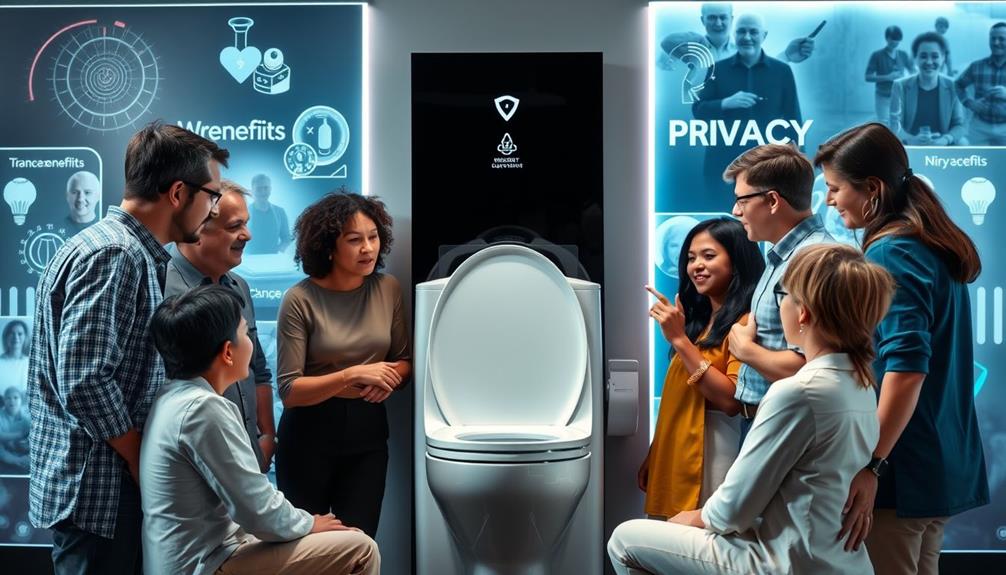
The study included 31 participants from 30 households, ensuring a diverse mix across various age groups. By targeting individuals aged 16 and older, the research aimed to capture a wide array of experiences with the smart toilet seat. Participants were strategically recruited from local newspapers, web-based news sites, and social media platforms in Gelderland, Netherlands.
This diverse demographic approach reflects the importance of understanding health management across different life stages, similar to how a holistic lifestyle approach enhances overall well-being during menopause.
However, certain exclusions were necessary to prioritize safety. The following groups weren't included in the study:
- Individuals weighing over 100 kg
- Pregnant women
- Pacemaker users
These exclusions were made to mitigate any health risks associated with the smart toilet technology. The study sought to create a representative sample across four age brackets: 16-30, 31-45, 46-65, and over 65.
This approach aimed for qualitative saturation, where a sample size of 30-40 households would reveal an extensive range of user experiences. Ultimately, the focus was on understanding how smart toilet data collection can promote health benefits while considering safety and inclusivity in the participant demographics.
Ethical Considerations in Research

What safeguards are in place to guarantee ethical integrity in research? In studies like those involving smart toilets, ethical considerations are essential. First, the researchers obtained full written consent from all participants, ensuring that individuals were fully informed about the data collection process. This step underscores the importance of informed consent in handling personal data, similar to how dog health and care emphasizes the well-being of canines through informed choices by their owners.
Before the study began, a thorough risk assessment identified no unacceptable risks, demonstrating the researchers' commitment to participant safety. Additionally, data anonymization was implemented to protect identities, aligning with core ethical principles of safeguarding sensitive health information.
Throughout the research, reflexivity was practiced, which means the team actively acknowledged their potential biases, encouraging a more objective approach. This awareness is vital in maintaining ethical integrity in research outcomes.
Moreover, the continuous modification of coding schemes during thematic analysis allowed researchers to accurately reflect emerging themes and participant perspectives. This adaptability highlights an ethical commitment to representing participants' experiences faithfully.
Altogether, these safeguards illustrate a strong framework for ethical considerations in research, ensuring that participant rights and safety remain a priority.
Expert Opinions on Smart Toilets
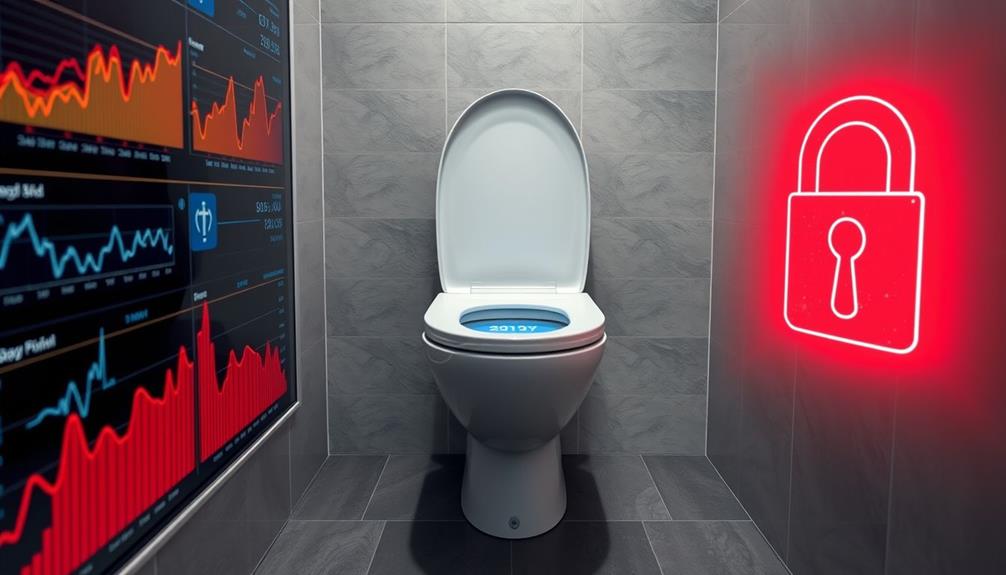
Experts frequently engage in heated discussions about smart toilets, highlighting a spectrum of opinions on their ethical implications. Some, like Renée Remijnse, strongly oppose using facial recognition technology in bathrooms, arguing it infringes on personal privacy and comfort.
Angelika Koppe echoes these concerns, questioning the necessity of invasive health-monitoring data collection. However, others, such as Diversey, advocate for visitor tracking in public bathrooms, suggesting that the operational benefits may outweigh privacy concerns.
The debate often centers around these key emotional points:
- Invasion of Privacy: Many fear the loss of personal space and comfort in such an intimate setting.
- Data Misuse: There's a growing anxiety about how collected data might be exploited or mishandled.
- Health Benefits: Proponents emphasize the potential for smart toilets to contribute considerably to medical research and public health.
As discussions unfold, experts remain divided on the ethics of advanced bathroom technology. Some call for stricter regulations to safeguard user data, while others emphasize the critical health advantages that smart toilets can provide.
Balancing these concerns is essential for the future of smart toilet implementation.
Future Trends in Smart Bathroom Tech
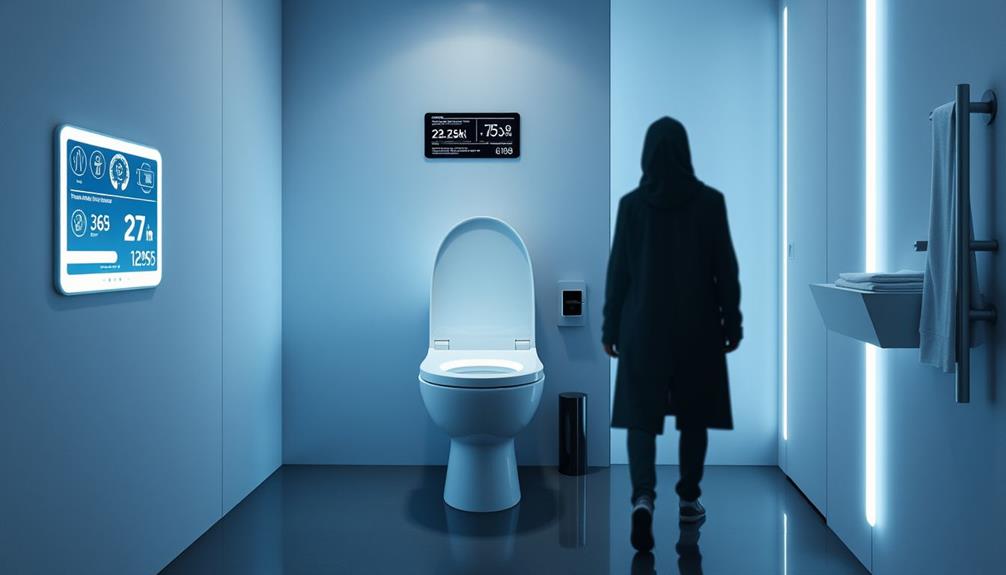
As debates about privacy and ethics continue, the future of smart bathroom technology looks promising and innovative. Imagine a world where public restrooms incorporate health monitoring systems that provide real-time data for entire populations. This evolution in smart bathroom technology is more than just convenience; it could enhance hygiene and sanitation by detecting health issues through waste analysis.
Here's a glimpse into future trends:
| Feature | Benefit | Privacy Concern |
|---|---|---|
| Health Monitoring Systems | Real-time health data collection | User consent and data security |
| Advanced Waste Analysis | Early detection of health issues | Data sharing policies |
| User-Friendly Smart Toilets | Accessible for everyone | Anonymity in data collection |
| Cost-Effective Technologies | Affordable health monitoring | Transparency in usage |
Research is also focusing on making these smart toilets cost-effective and user-friendly, with advancements in portable mass spectrometry. As cities aim to integrate smart bathroom technology into their infrastructures, the potential for improved public health outcomes becomes increasingly clear. Balancing these benefits with privacy will be essential as we move forward.
Frequently Asked Questions
What Are the Cons of Smart Toilets?
Smart toilets can invade your privacy by collecting sensitive data, potentially leading to unauthorized access. You might feel uncomfortable with their use, fearing that personal health information could be misused or shared without your consent.
How Smart Toilets Can Monitor Health?
Smart toilets monitor your health by analyzing urine for metabolites, detecting changes in flow, and identifying biomarkers. This technology provides real-time insights into your nutritional status and potential health issues, enabling proactive health management.
Are Smart Toilets Worth It?
Smart toilets can be worth it for you if you're interested in proactive health monitoring. They offer valuable insights into your metabolic health, making it easier to track changes and address potential health issues early.
Is There a Smart Toilet That Identifies Analprints?
Currently, there isn't a smart toilet specifically designed to identify analprints. While the technology is theoretically possible, it's still in development, focusing more on health monitoring rather than biometric identification, ensuring user privacy remains a priority.
Conclusion
As the debate over smart toilet data collection heats up, it's crucial to weigh the pros and cons carefully. While these innovations can enhance your health monitoring, they also raise significant privacy concerns. It's vital to find a balance that keeps your personal information safe while reaping the benefits of technology. Ultimately, staying informed and vigilant will help you navigate this evolving landscape, ensuring you don't throw the baby out with the bathwater.
